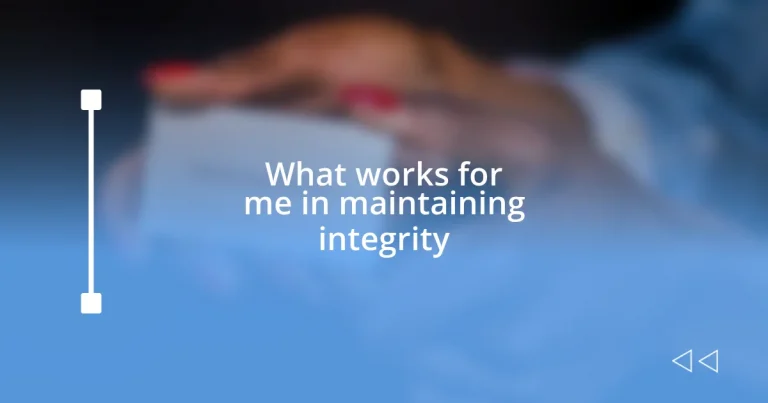Key takeaways:
- Personal integrity involves aligning actions with core values and making choices that reflect one’s beliefs, even in uncomfortable situations.
- Setting clear boundaries is crucial for maintaining integrity, as it protects one’s values and promotes mental well-being, while respecting personal needs.
- Lifelong learning and self-reflection are essential for continuous self-improvement, enhancing confidence, and ensuring actions consistently align with core principles.
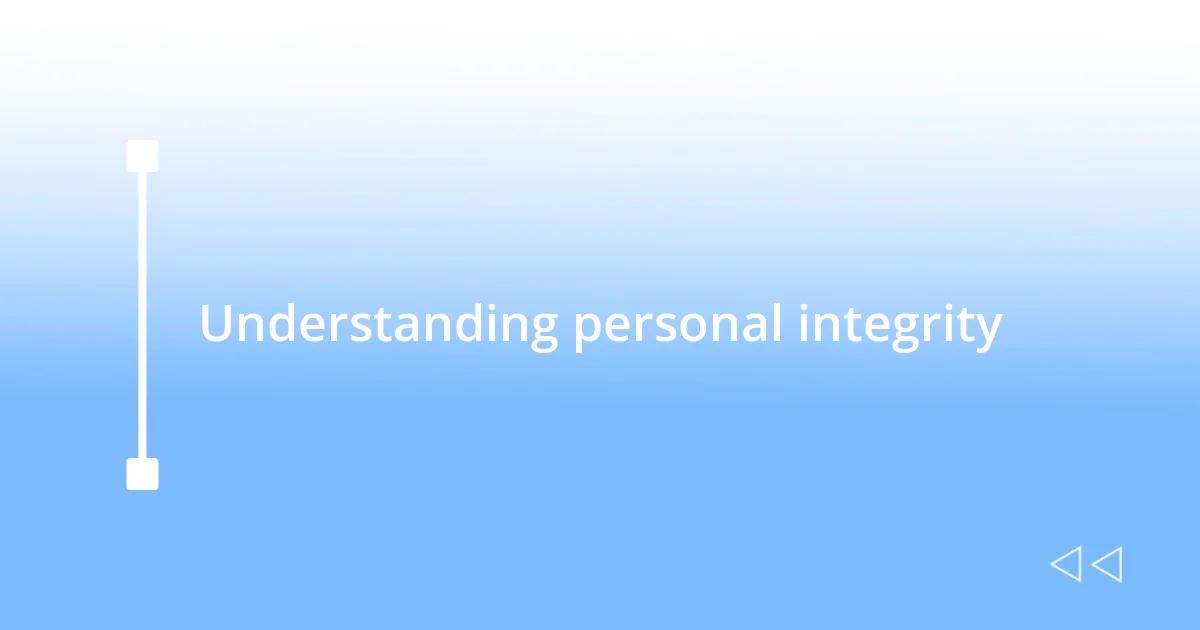
Understanding personal integrity
Personal integrity is about staying true to your values and beliefs, no matter the situation. I remember a time when I faced a tough decision at work where taking the easy route would have meant compromising my principles. Instead, I chose the path that aligned with my integrity, even though it was uncomfortable. This experience reinforced my understanding that integrity isn’t just about avoiding dishonesty; it’s about holding steadfast to what truly matters to you.
I often find myself reflecting on moments where my integrity has been tested. For instance, a friend once asked me to overlook a minor ethical breach that would have benefited both of us. In that moment, I had to ask myself: What kind of person do I want to be? Choosing to speak up created an uncomfortable conversation, but it strengthened my self-respect and our relationship in the long run. It’s these small choices that define who we are and how we engage with the world around us.
Understanding personal integrity is also about recognizing how our actions align with our inner values. Have you ever felt that gnawing feeling in your gut when something didn’t sit right? That’s your integrity signaling to you. I’ve learned that these internal nudges are vital clues about areas where we may need to reflect or change course. They guide us in cultivating a life that feels authentic and aligned with our true selves.
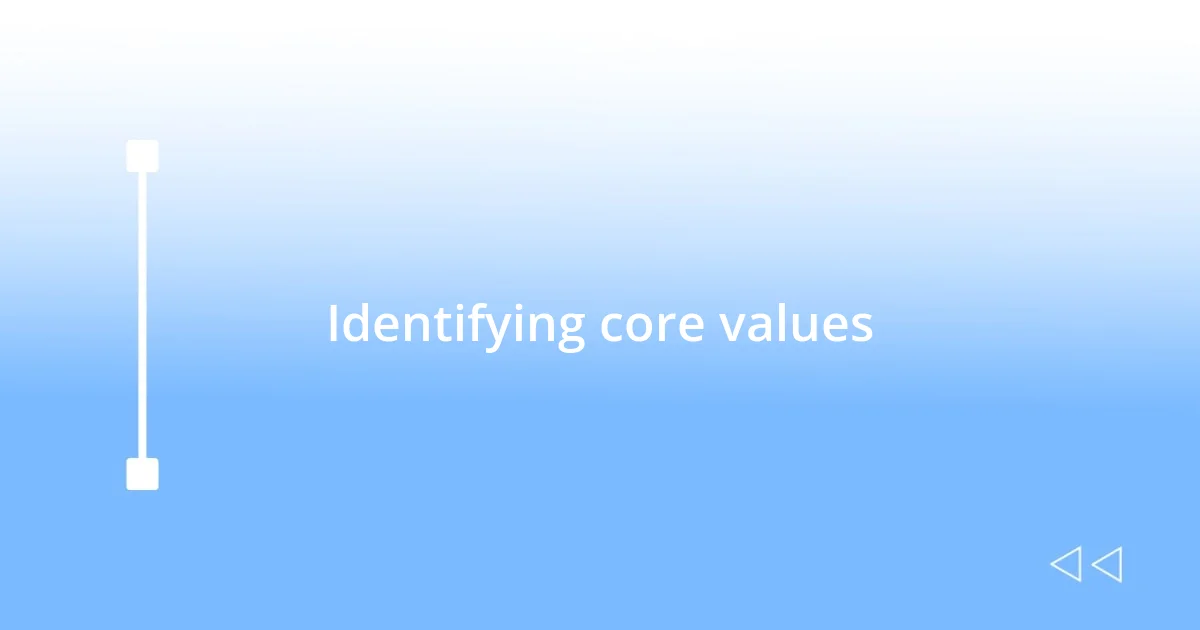
Identifying core values
Identifying core values is a deeply personal journey for me. I’ve spent countless hours reflecting on what truly matters in my life, leading me to define those values that serve as my compass. During a particularly challenging time, when I witnessed colleagues compromising on quality for quick wins, it reinforced my belief in excellence and accountability. That experience not only underscored my commitment to these values but also prompted me to advocate for a culture of integrity in my workplace, which I found incredibly fulfilling.
To help clarify your own core values, consider these guiding questions:
- What principles do I hold most dear, even when faced with pressure?
- When have I felt the most proud of my actions, and what values were behind them?
- What qualities do I admire in others that resonate with my sense of right and wrong?
- How do my values guide my decisions in both personal and professional contexts?
By reflecting on these questions, we can more clearly identify the values that genuinely resonate with us, creating a solid foundation for our integrity moving forward.
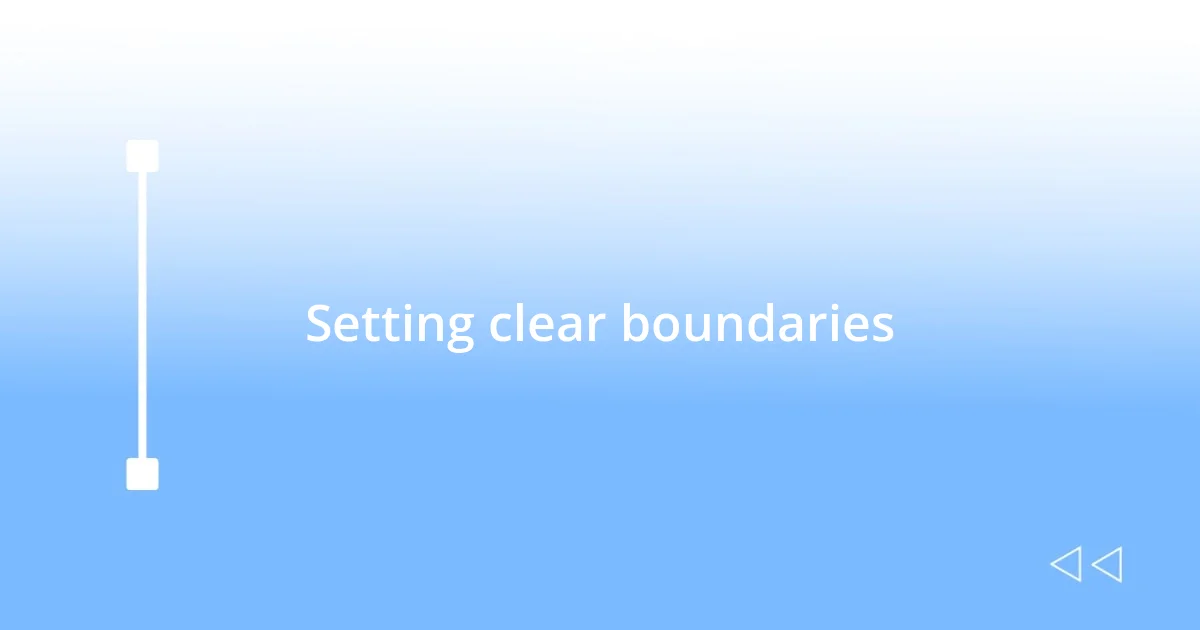
Setting clear boundaries
Setting clear boundaries is essential for maintaining integrity. I can recall a time when a colleague continually tried to push their responsibilities onto me, thinking it was easier for both of us. At first, I hesitated, wanting to maintain harmony, but I realized that saying no was necessary to protect my own values and workload. Establishing that boundary ultimately strengthened our professional relationship and ensured I remained true to my commitments.
When I think about boundaries, I also reflect on how they impact our mental well-being. There was a period in my life where I was overwhelmed with social obligations, and my integrity felt compromised because I was stretched too thin. Once I learned to say no and prioritize my time, I felt an immense relief. It’s not just about protecting yourself from others; it’s about respecting your own needs and values. It changed the way I approach my commitments, leading to healthier relationships and a clearer focus on what’s truly important to me.
To set clear boundaries, I often remind myself that it’s okay to prioritize my well-being and values. There are moments when I need to distance myself from toxic influences, even if it’s tough. I believe that setting boundaries is a way of honoring what I stand for and creating an environment where I can thrive. I’ve learned to communicate my limits openly, and the respect that comes from doing so has been both empowering and fulfilling.
| Boundary Type | Example |
|---|---|
| Work Boundaries | Declining additional projects when at capacity |
| Personal Boundaries | Limiting social engagements to ensure personal time |
| Emotional Boundaries | Not allowing negative comments to affect self-esteem |
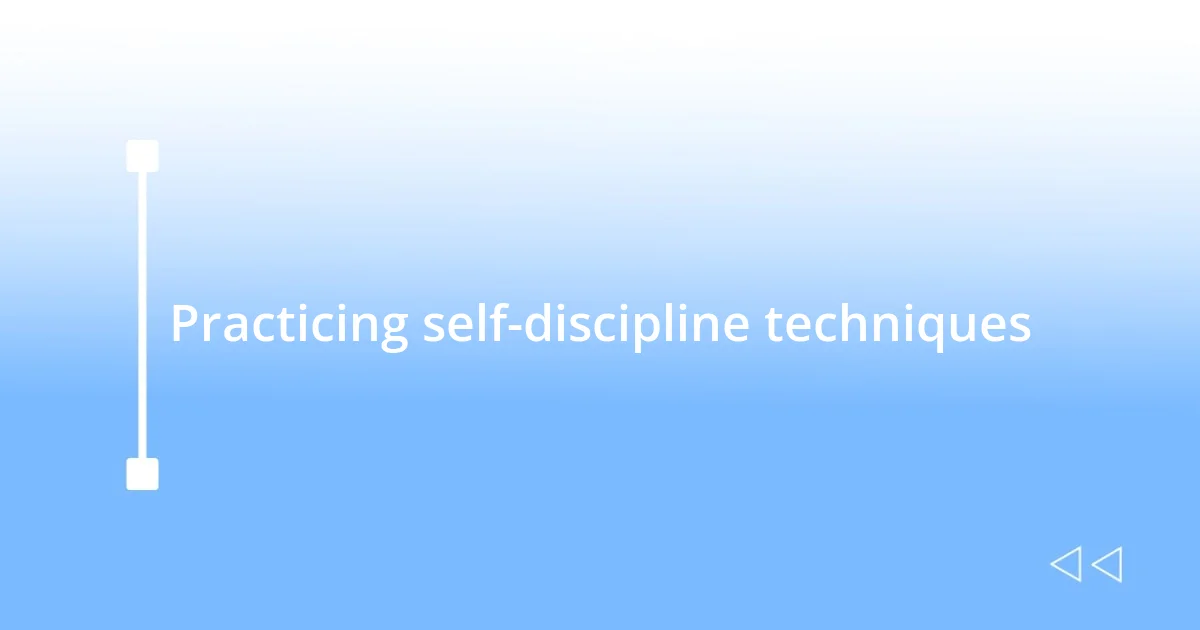
Practicing self-discipline techniques
Practicing self-discipline techniques has been a cornerstone of my ongoing journey toward integrity. I vividly remember a time when I struggled with distractions while working from home. Establishing a structured daily routine, complete with specific work hours and breaks, dramatically improved my focus. This simple technique of maintaining structure empowered me to adhere to my goals and stay true to my values, even when the allure of a cozy couch called my name.
I also find that setting achievable goals helps me cultivate self-discipline. When I decided to commit to regular exercise, I started with just 15 minutes a day, gradually increasing it as I built momentum. This incremental approach made the discipline feel less daunting and allowed me to celebrate small victories along the way. Isn’t it fascinating how tiny steps can lead to significant progress? By crafting strategies that felt attainable, I reinforced my commitment to my wellbeing and my values.
Reflection is another essential technique for practicing self-discipline. I set aside time each week to evaluate my decisions and actions, asking myself questions like: “Did I uphold my commitments?” or “What challenges did I face, and how did I respond?” This practice not only holds me accountable but also allows me to learn and adapt. When I notice a misalignment between my actions and values, I can course-correct, ensuring that my integrity remains intact. How do you hold yourself accountable? Finding the techniques that resonate with you might be the key to your own journey of self-discipline.
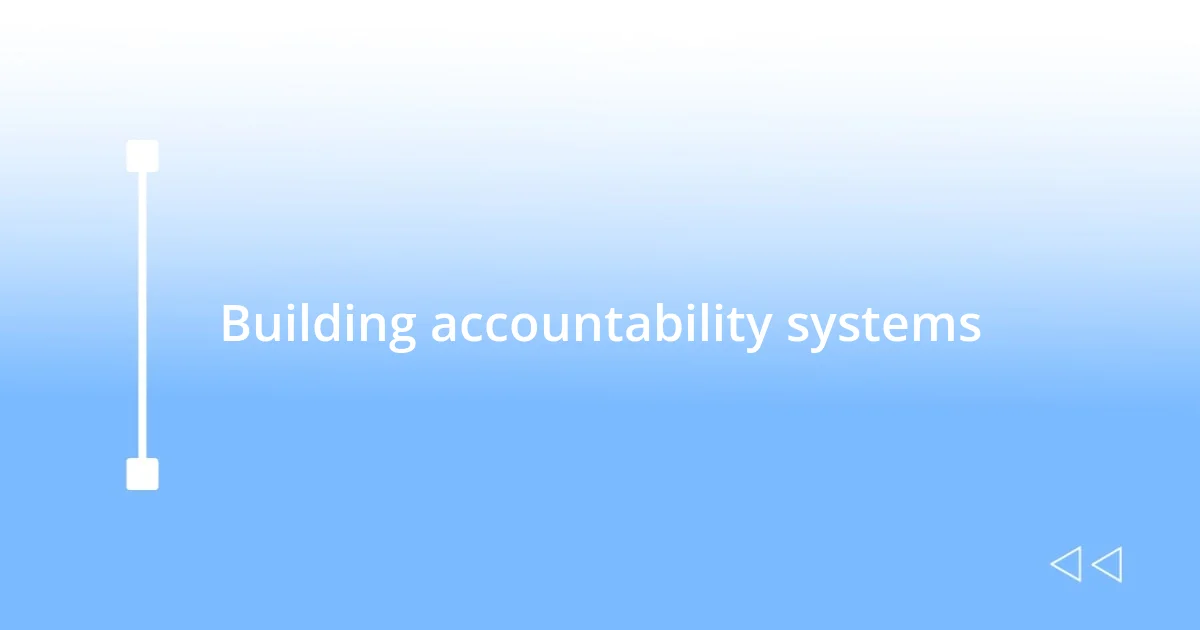
Building accountability systems
Building a solid accountability system is something I’ve actively pursued throughout my career. One experience stands out: I grappling with a project deadline, and I realized that relying solely on my own motivation wasn’t enough. I reached out to a trusted colleague and we set regular check-ins to discuss our progress. Having that external touchpoint made me feel more accountable. It was as if I was sharing the weight of my commitments, and it became easier to stay on track.
From my perspective, technology can play a big role here as well. I’ve started using apps that help track my tasks and goals, and it’s amazing how visualizing my progress changes my mindset. Each time I mark something as completed, it’s a little boost that reinforces my decision to stay committed. Doesn’t it feel great to see tangible evidence of your efforts? This simple act of tracking has transformed the way I approach accountability.
I’ve also found that connecting my accountability to my core values enhances my commitment. When I think back to a time I committed to volunteering, being part of a team made me feel responsible not just to myself, but to others. That accountability motivated me through challenges that would have derailed me on my own. Who do you feel accountable to in your life, and how does that connection influence your actions? I believe it’s this dual accountability – to oneself and to others – that really fortifies our integrity.
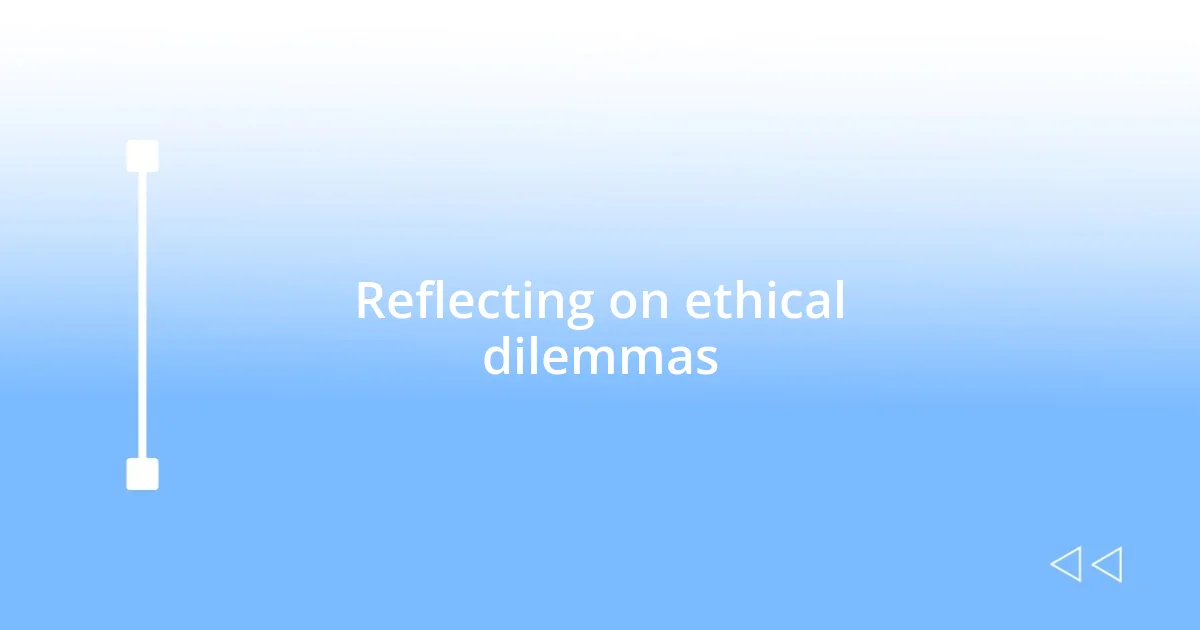
Reflecting on ethical dilemmas
Reflecting on ethical dilemmas often involves grappling with uncomfortable feelings. I remember facing a tough choice at work where a decision could have benefited me financially but hurt a colleague. I wrestled with the temptation, thinking, “Is my success worth someone else’s setback?” That moment pushed me to align my actions with my values, reminding me that integrity sometimes requires making sacrifices that may not yield immediate rewards.
As I reflect on these dilemmas, I notice that I often write down my thoughts and feelings in a journal. This practice allows me to untangle my emotions and see the situation in a clearer light. For instance, during a particularly challenging negotiation, I detailed my frustrations, fears, and aspirations. By externalizing those thoughts, I discovered that my ultimate goal wasn’t just to win—but to create a fair outcome. How often do we give ourselves the space to reflect deeply on our decisions?
In another instance, a friend confided in me about a moral dilemma they faced. They were torn between delivering harsh feedback or sugarcoating it to spare feelings. Listening to their struggle reminded me of my own journey and the role ethical discomfort plays in shaping our integrity. I shared my perspective that honesty, though sometimes painful, builds trust in the long run. Isn’t it fascinating how these reflections, whether personal or shared, can guide us through the labyrinth of ethical choices?
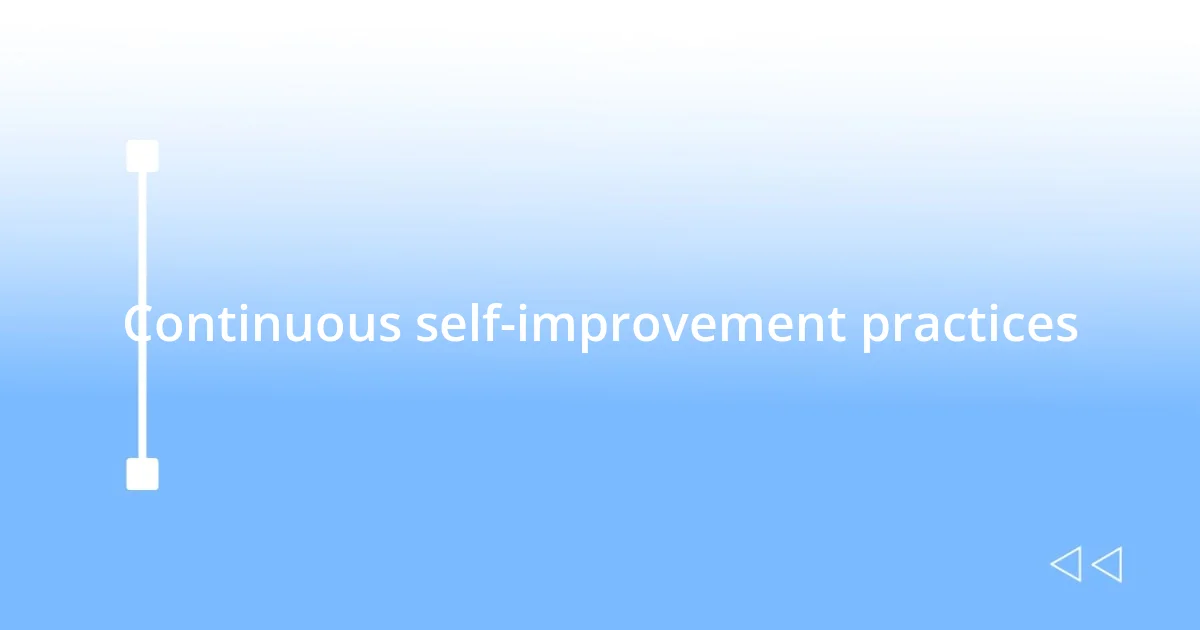
Continuous self-improvement practices

Continuous self-improvement practices
Engaging in lifelong learning has profoundly impacted how I maintain my integrity. When I commit to learning something new, whether it’s a skill related to my career or a personal hobby, I feel revitalized and more assured in my actions. For instance, I enrolled in a public speaking course that not only helped me articulate my thoughts better but also allowed me to express my values clearly. Has there ever been a moment when you felt more confident after learning something new?
I vividly remember struggling to convey my thoughts during a team meeting. It led me to seek feedback and practice regularly, and this journey is ongoing. Every time I put my ideas out there, I learn what resonates with others and reflect on how I can stay true to my core beliefs. It’s a continuous cycle of growth and self-assessment. How often do we take the time to evaluate whether our skills align with our principles?
Additionally, I find that setting specific, measurable goals keeps my self-improvement on track. For instance, I began a daily reading habit, focusing on books related to ethics and leadership. This steady commitment not only broadens my knowledge but also prompts me to consider how these insights shape my decisions. The question I ask myself often is, “How can what I learn today inform my actions tomorrow?” This practice reinforces my integrity and transforms self-improvement into a fulfilling journey rather than a mere checklist.












